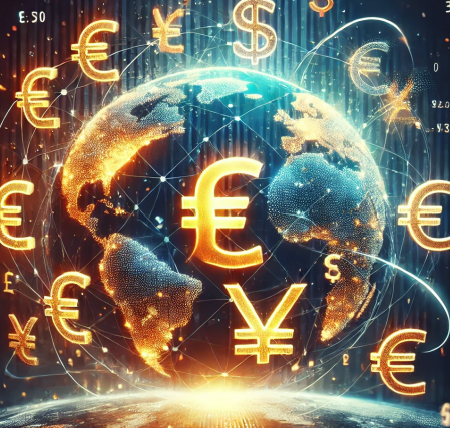Fintech’s Hidden Game-Changers in Fintech: Innovations You Can't Afford to Miss
Although the financial technology industry has grown to be a powerful force, digital wallets, robo-advisors, and blockchain are only a few examples of what we see in the media. Under the surface, a subtle revolution is taking place, with innovations that have the potential to alter not just how we handle our finances but also how we perceive financial services in general. It's time for financially astute people to look past the well-known fintech solutions and concentrate on the unseen game-changers that might characterize the upcoming financial innovation wave.
The Silent Revolution: A New Fintech Era
Popular ideas like Bitcoin or Buy Now, Pay Later (BNPL) services are frequently the first things that come to mind when we think of fintech. These are the inventions that make the most news and provoke debates in the general public. The real change in the financial environment, however, is taking place in less visible but possibly more significant areas.
The present stage of fintech is characterized by a move away from traditional financial institutions and centralized control, from breakthroughs in financial inclusion to decentralized finance (DeFi) protocols. The race is about developing more accessible, effective, and secure financial systems, not just about making transactions easier. A variety of hidden innovations are gaining traction as fintech develops further; they are breakthroughs with scalability, practical application, and significant ramifications for both consumers and enterprises.

Unexpected Developments: Fintech's Best-Kept Secrets
Decentralized Evaluation of Credit Using Non-Traditional Information
A significant section of the population is excluded by traditional credit scoring models, which are based on restricted financial histories, such as credit card use or loan repayment records, particularly in emerging nations. A new generation of decentralized credit scoring, however, is making use of unconventional data, like utility bills, rental payment histories, and even usage habits of mobile phones. This makes it possible for people to obtain loans and financial services even if they have little to no official credit history.
For instance, Tala, a startup in Kenya, evaluates creditworthiness using data from mobile phones. It creates a customized score in real time by examining past transactions and even social media behavior. In areas with limited access to traditional banking infrastructure, this strategy not only facilitates credit availability but also advances financial inclusion.
Principal Advantage: Increases underbanked people' access to credit.
provide a richer, more precise picture of people's financial activities.
expands access to financial services in areas without conventional banking facilities.
Tools for Regulatory Compliance Driven by AI
It gets harder to stay in compliance with national and international rules as fintech regulations keep changing. Introducing regulatory compliance technologies driven by AI. By using machine learning, these solutions assist fintech companies in automatically identifying and adjusting to regulatory changes, hence lowering the risk of fines and penalties.
ComplyAdvantage is a notable example, which use AI to search databases, court documents, and news sources for possible threats of money laundering or terrorism financing. The software lets financial institutions stay ahead of regulatory developments in real time by automating this procedure.
Principal Advantages:
minimizes human error in procedures related to compliance.
increases the speed at which regulatory changes are responded to.
reduces the running expenses related to manual compliance checks.
Blockchain Authentication Using Biometrics for Safe Transactions
One of the biggest concerns in digital money is still security. However, in light of increasingly complex cyberthreats, conventional authentication techniques—passwords, PINs, and even two-factor authentication—are becoming antiquated. The application of biometric blockchain authentication is a recent and fascinating development.
Fintech businesses may guarantee more secure transactions by fusing blockchain technology with biometric data, such as fingerprints or facial recognition. The dangers of fraud and data breaches are decreased because the data is encrypted and kept on a decentralized network. WeChat Pay and Alipay are already investigating similar technologies in China, providing consumers with a smooth and safe mobile payment experience.
Principal Advantages:
Boosts security by utilizing blockchain and biometric data.
minimizes identity theft and fraud in financial transactions.
improves user experience by facilitating quick and easy authentication.

Marketplaces for Carbon Credit Driven by AI
Businesses and individuals alike are searching for methods to offset their carbon footprints as a result of the increased worldwide awareness of climate change. One potential remedy is the emergence of AI-powered carbon credit marketplaces, which enable people to purchase and sell carbon credits in an open, decentralized fashion.
These marketplaces link buyers and sellers of carbon offsets using artificial intelligence (AI), guaranteeing that transactions are legal and in line with environmental objectives. One such example is CarbonX, a platform that tokenizes carbon credits using blockchain technology and employs artificial intelligence (AI) to determine the best ways for businesses to offset their emissions. Both individuals seeking to support eco-friendly efforts and corporations seeking to become more sustainable may find this invention to have important ramifications.
Principal Advantages:
increases accessibility to carbon offsetting, which supports environmental sustainability.
uses AI to guarantee the legitimacy and efficacy of carbon credits.
supports international initiatives to combat climate change and cut greenhouse gas emissions.
Impact on Consumers: How These Tools Reduce Risks, Save Time, and Save Money
The aforementioned inventions provide consumers with real advantages beyond merely being technological breakthroughs. For example, millions of people without traditional credit records can now obtain loans thanks to decentralized credit scoring, which can result in increased financial stability and wealth-building prospects. By guaranteeing that financial institutions follow the strictest security guidelines, artificial intelligence (AI)-powered regulatory compliance tools lower the risk of fraud and protect users.
By doing away with the need for complicated passwords and PINs, biometric blockchain authentication not only improves security but also simplifies the user experience. Furthermore, AI-powered carbon credit exchanges allow customers to support environmental sustainability initiatives while guaranteeing the safety and effectiveness of their investments.
To put it briefly, these advances are the meeting point of ethical responsibility, convenience, and security. They enable customers to make smarter financial decisions while reducing risks and opening up new opportunities by offering practical answers to persistent problems.

Future Prospects: Forecasts for 2025–2030
The fintech industry is expected to grow and change quickly in the future. In the years leading up to 2025–2030, keep an eye on these important trends:
Supervisory Sandboxes: We should anticipate the expansion of regulatory sandboxes—controlled settings where fintech entrepreneurs can test their products without subjecting them to full regulatory scrutiny—as governments continue to embrace fintech. Cross-Industry Synergies: Fintech will keep integrating with other sectors, like healthcare, insurance, and real estate, to develop new hybrid models that will promote innovation while guaranteeing consumer safety. Blockchain-based smart contracts, for example, have the potential to revolutionize real estate transactions by increasing their speed and transparency.
AI-Driven Financial Services: AI will continue to play a bigger part in managing personal finances. Customers will gain from more specialized and efficient financial products, such as AI-based investment plans and smarter budgeting tools.
Sustainability in Finance: Financial products and services that give environmental, social, and governance (ESG) factors top priority will grow significantly as customer demand for sustainability rises.
How to Identify the Upcoming Fintech Star
The fintech industry is always changing, so having an eye for new trends is essential to detecting the next big thing. Here is a guide to help you:
Seek Scalability Innovations ought to be able to expand beyond specialized markets and find use on a global scale.
Pay Attention to Customer-Centric Solutions: Technologies that increase transparency, security, or accessibility will always be popular.
Give ethical considerations a priority: Long-term traction is more likely for fintech solutions that support sustainability, ethical finance, or financial inclusivity.
Examine Market Adoption: Whether through startups or early adopters in well-established financial institutions, the technology should already be gaining traction in practical applications.
Fintech is developing quickly, and those that remain on top of it will reap the greatest rewards. These hidden innovations could be tomorrow's game-changers, so keep an eye on them.
(Writer:Lorik)





